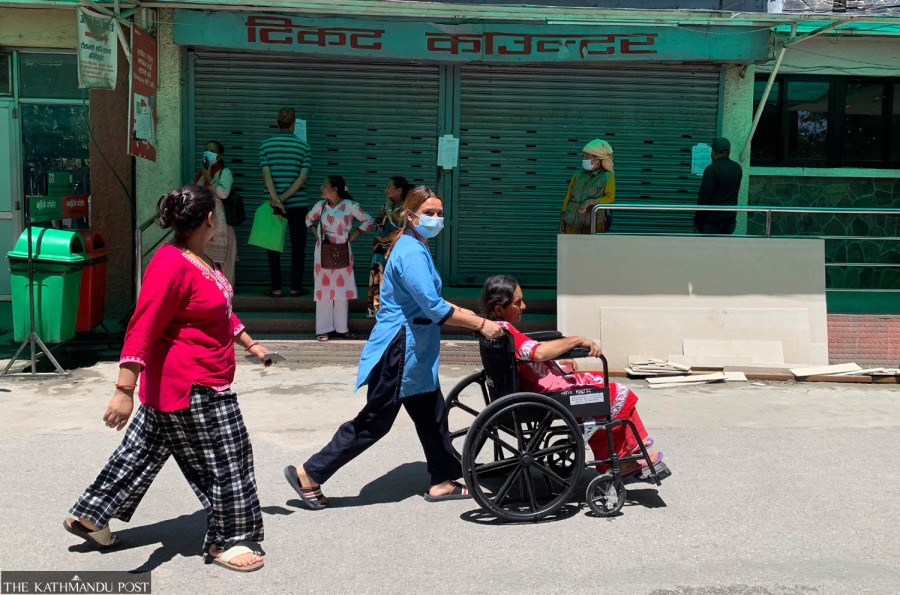Health
When doctors chose protest over patients
Thousands suffered on Monday after doctors skipped duties at public hospitals to protest Consumer Court verdicts.
Arjun Poudel
Doctors at the National Trauma Center had asked Himal Sapkota, a patient with a critical head injury, to come to the hospital on Monday morning to be admitted for a major surgery. Sapkota and his father arrived on time—only to learn that the doctors at the hospital were on strike.
“We travelled all the way from Dailekh for the treatment but couldn’t meet the doctor,” complained Gajadhar, Himal’s father, who was found waiting on the hospital premises until 3 pm. “We were first asked to come for surgery a month ago, but later they asked us to report after a month, and now we cannot see the doctor.”
This story is echoed by tens of thousands of ailing people who reached state-run health facilities across the country on Monday morning but were denied treatment due to the doctors’ strike.
Doctors at state-run health facilities refused to attend to patients in the out-patient department, following a service boycott called by the Nepal Medical Association, the umbrella organisation of medical doctors.
The association’s protest was against recent rulings by the Consumer’s Court, which slapped heavy penalties on doctors found guilty of gross medical negligence.
In its verdicts, the court imposed heavy penalties on three private hospitals—Rs5.68 million on the Chabahil-based Om Hospital (8 percent to the hospital and 20 percent to the doctors involved); Rs5.7 million on Grande City Clinic (Rs4 million to the doctors and Rs1.7 million to hospital); and Rs14.5 million on Himal Hospital (70 percent to the doctor and 30 percent to hospital).
“Halting hospital services and denying treatment to patients has become a tactic for the association to put pressure on the government,” said Jyoti Baniya, chair of the Forum for the Protection of Consumer Rights-Nepal. “We have furnished a memorandum to the prime minister and asked him to act against those depriving patients of treatment.”
Denial of treatment violates patients’ constitutional rights. As per the National Penal (Code) Act 2017, it can lead to imprisonment of up to three years or a fine of Rs30,000.
Monday’s strike was the second called by the association in the past three months. In April, the association had instructed its member doctors to shun services to put pressure on private medical colleges to provide stipends on par with those offered by government-owned colleges.
Aakriti Triphiti, legal officer at the Forum for the Protection of Consumer Rights-Nepal, said the court has yet to make details of the verdicts public.
“Doctors halt essential services even without knowing what is written in the detailed verdict, which is a crime in itself,” said Tripathi. “We are discussing filing another contempt of court case against doctors’ leaders.”
Gajadhar, a local from ward 6 of Naumule Rural Municipality in Dailekh district said he has nothing to do with the doctors’ protest and the court’s verdict and is only concerned about the deteriorating health of his son Himal, 30, who is the family’s sole breadwinner.
Himal, who used to work as a labourer in the Kalimati area in Kathmandu, was taken to hospital unconscious by police some two months ago. He had sustained a serious head injury during an altercation with a fellow labourer.
“We had also come to the hospital a month ago, as doctors had asked us to come for surgery,” his father said. “But they sent us away then and told us to come today [Monday]. We cannot afford private treatment.”
Some patients, who were denied treatment at state-run-hospitals, were lured to the doctors’ private clinics.
Experts, as well as former office bearers of the Nepal Medical Council, say boycotting treatment to protest court verdicts is unjustifiable. They say patients and their relatives have the right to seek legal remedies if they feel they or their patients have been harmed due to medical negligence.
Meanwhile, officials at the Ministry of Health and Population said that they are trying to sort out the issues raised by the doctor’s association.
“Health services, which are very essential, should not be halted under any circumstances,” said Dr Prakash Budhathoky, spokesperson of the Health Ministry. “We have been coordinating with relevant agencies to address the concerns of the agitating doctors at the earliest.”




 23.27°C Kathmandu
23.27°C Kathmandu















